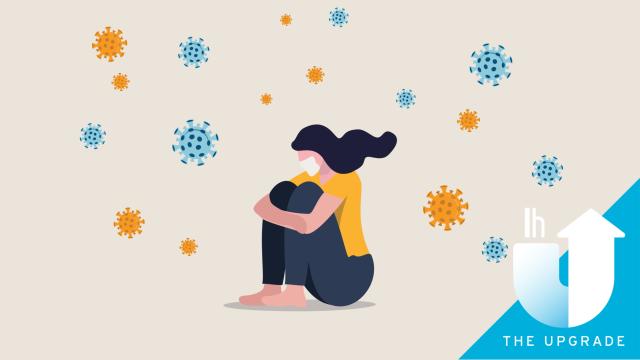We’re learning how to take our anxiety down a notch this week with help from cognitive behavioural experts Dr. Elena Welsh and Dr. David Burns. Listen to hear these two experts give tips on how to tame your anxiety using specific CBT methods, why it is that we tend to go down these anxiety spirals in the first place, and how to change our thinking and realise better outcomes.
Dr. Welsh is an LA-based psychologist who specialises in a wide variety of anxiety, mood, and depressive disorders, and is the author of The Cognitive Behavioural Therapy Work Book for Panic Attacks. Dr. Burns is a pioneer in CBT and is the author Feeling Good: The New Mood Therapy, and most recently Feeling Great: The Revolutionary New Treatment for Depression and Anxiety.
Listen to The Upgrade above or find us in all the usual places podcasts are served, including Apple Podcasts, Google Play, Spotify and iHeartRadio.
Highlights from this week’s episode
From the Dr. Elena Welsh interview
On how CBT works:
[T]he basic premise behind CBT is that your thoughts, behaviours, [and] your emotions are all interconnected. [R]eally, you can intervene at any point. [I]f you change your behaviour, it’s going to have subsequent changes for your emotions and your thoughts. If you change your thoughts, you’re going to have changes in your behaviour and your emotions, so just that everything is interconnected. So CBT in terms of, again, where we’re trying to make changes. Usually it starts with looking at the thoughts and behaviours. So particularly with disorders like anxiety, a lot of times our thought patterns are what kind of kick-off this cascade of then physical symptoms, because our body is prompted to think we’re in danger. So if we can even do a little bit of modifying of the thoughts that automatically come up in kind of worry-provoking or anxious situations, then you’re kind of again, shifting subsequently your behaviour and your emotions and your physiological reaction.
On how to calm yourself down when you start to feel anxiety setting in:
[W]hat’s happening with all our stress-related diseases is, “I’m worried about losing my job, losing my home, being homeless…” My body thinks that’s really happening. My body’s like, “oh, we’re in danger. Freak out.” And that’s where the stress hormones are released. Your heart might start pounding. You feel that kind of shortness of breath. So just understanding what’s happening physiologically when you worry, I think is a really helpful tool…Some people notice their physiological symptoms first like their heart rate. Some people notice their thoughts first. So whatever you notice first. But anytime you notice yourself kind of getting activated in that way, just even remembering, “OK, my body thinks I’m facing a real danger. Let me take a deep breath.” That immediately brings on the part of your brain that slows down the fight or flight response and kind of starts to calm you down. And even saying aloud or kind of thinking to yourself, “everything’s OK right now. I’m having a worry thought about a future event.” So literally kind of narrating what’s happening for your brain then helps everybody kind of work together. And then you can calm down a little bit.
From the Dr. David Burns interview
On the common misunderstanding about motivation with regard to anxiety and depression:
[P]eople used to think, “Oh, those people who are fighting treatment, they seem stuck in their depression. They want to feel sorry for themselves or they have secondary gains. [T]hey want to try to get attention from people.” And that’s how therapists, since the time of Freud have been thinking about resistance and why people get stuck in depression. But there’s two problems with those interpretations. First of all, they’re really hurtful to people. They’re insulting…So they don’t help anybody. And most of the time, they’re not even true. And what we’ve discovered is that people get stuck in depression and also anxiety and relationship problems and habits and addictions for different reasons, but people get stuck in depression and anxiety because your symptoms are actually the expression of what’s most beautiful and awesome about you.
On the best way to be supportive of someone experiencing anxiety or depression:
[M]ost people don’t know how to help a loved one. They try to cheer them up or tell them to correct their distorted thoughts. And that is never going to be effective. And what you need to learn is compassionate listening…You know, it’s just listening and providing support rather than trying to cheer someone up or throw help at them.
To hear more practical advice from Dr. Welsh and Dr. Burns, give the full episode a listen.
Episode Transcript

Leave a Reply
You must be logged in to post a comment.